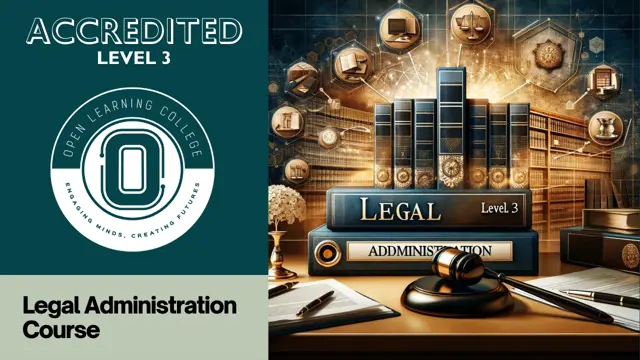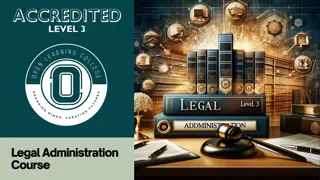
Legal Administration (Level 3) Diploma
Distance Learning Course, featuring tutor support and AI assistance, available online or as a study pack option.
Open Learning College
Summary
Funding options are available on our website
- QLS & OPA - Free
- Exam(s) / assessment(s) is included in price
- Tutor is available to students
- TOTUM card included in price What's this?
Add to basket or enquire
Overview
Embark on a transformative learning journey with the UK’s most innovative home study provider, offering courses designed to unlock your true potential and facilitate the career change you desire. Access our distance learning courses directly from anywhere, anytime, and acquire industry-recognised Professional Qualifications essential for advancing in your career.
Specifically, explore the flexible and convenient Legal Administration (Level 3) course, an ideal way to gain a diploma qualification. Whether you aim for further education, improved job prospects, or expanded knowledge, this comprehensive course allows you to prepare thoroughly for exams or careers through home study. Plus, it’s structured to be accessible and beneficial even if you have no prior knowledge in Legal Administration.
This course is a must for secretaries and administrators contemplating working in a legal environment, whether it be in a solicitor’s office or in the legal department of a large firm. As well as giving an insight into legal administration the course covers in depth knowledge of each legal area which hopefully will give the learner an appetite to study law at a higher level. Many ambitious legal secretaries have gained a taste for law and have gone on to pursue a career in the law qualifying as legal executives, licensed conveyancers or solicitors.
Achievement
Course media
Resources
- Legal Administration Level 3 (QLS) Course -
Description
Course Key Topics
the Legal Administration (Level 3) course is divided into 10 modules.
Module 1: Introduction to working in a legal office
This module will look at the different departments within a legal office – and take a brief look at the different types of legal work carried out such as Conveyancing; criminal and civil litigation; wills and probate and family. The module will also examine the roles and training of people within a legal environment such as solicitor, barrister, legal executives, licensed conveyancers, legal accounts staff etc.
Module 2: The role of the legal secretary and client care
The module looks at attending client interviews, attendance at court; taking messages dealing with telephone calls and anti-money laundering procedures such as collecting identification evidence from clients. Also covered is a wholly important area client confidentiality and the requirements of the legal secretary.
Module 3: Legal administration and systems
The virtues of different types of filing and diary systems will be considered along with Health and safety issues and requirements. Other systems such as dealing with incoming and outgoing post and document exchange systems will be examined. A very important commodity is time management which will be studied. And the structure of law firms will be examined –using a fictitious firm –so the hierarchy of firm will be examined; so will team structure within the firm and the possible structures of the firm itself – whether a limited company, limited liability partnership or partnership.
Module 4: Office procedures of the legal profession
In legal work attention to detail and accuracy is crucial so typing and processing and proof reading letters and legal documents will be considered. In this module there is list of commonly used legal words and abbreviations included together with practice in using these.
Module 5: Introduction to Law
The module will look at where the law comes from – sources of law- and how it is used through Acts of Parliament [Statutes] and judge made law – case law. The different types of Courts are then considered – how they work and their personnel. Particular statutes relevant to working in the legal profession such as data protection act, and equal opportunities act relevant to employment law will be considered in outline.
Module 6: Conveyancing
Looking at the first of four modules which covers working in a specific department in legal office. This module looks at the role of the legal secretary within the Conveyancing department of a fictitious legal firm. The module tracks the Conveyancing procedure from taking instructions from the client through to exchange of contracts and completion. The legal secretary will need to be familiar with all the forms involved in Conveyancing and this module explains these and how they should be completed.
Module 7: Criminal litigation
Here we look at the work within the criminal litigation department. The procedure is tracked from the client’s arrest at the police station through to the appearance at Magistrates Court and Crown Court. Some criminal law is included in this module explaining the mental and physical elements required to commit a crime. The main emphasis of this module is the role of the legal secretary concerning the preparation of the documentation involved in a criminal case such as instructing a barrister to act in the case and typing witness statements and brief to counsel.
Module 8: Wills and probate departments
This module visits the Wills and probate department – sometimes referred to as the private client department. The module will look how a Will is prepared and the law regarding the signing of a valid Will. The module will then look at the forms required when someone dies either leaving a Will or without a Will. The legal secretary will be required to type up these forms with great accuracy and a Grant of Probate or Letters of Administration will issue to enable the estate to be wound up.
Module 9: Working within the family department
Concentrates on work within the Family Department. This department will deal with what happens in the family department of a firm, mainly divorce and matters relating to children’s welfare. The law relating to divorce will be explored and the legal secretary will have practice at completing a divorce petition and other associated forms.
Module 10: Civil litigation
This final module considers work in the civil litigation department. It tracks the procedure and forms in taking a county court action and looks at the documents the legal secretary will need to prepare. There are some final quizzes and questionnaires to round off this exciting and useful course.
What Will You Learn?
- In Legal Administration (Level 3), we will learn about the fundamental principles and practices of the legal profession.
- This course will cover a wide range of topics such as legal terminology, court procedures, legal ethics, and client communication. We will also learn about the role of legal administrators in the legal system and how they support lawyers and other legal professionals.
- Additionally, we will gain an understanding of the different areas of law, including civil, criminal, and family law, and how they are applied in the legal system.
- Through this course, we will develop the necessary skills and knowledge to effectively assist in the administrative tasks of a legal setting.
Course Entry Requirements
At Open Learning College, we firmly believe that education should be accessible to everyone, regardless of their background or previous education experience. That’s why we’ve designed our Legal Administration (Level 3)course to be open to anyone who is interested in learning more about this fascinating subject, without any prior knowledge or experience required.
We want to give everyone the opportunity to expand their knowledge and take part in a highly rewarding online course, which is why we keep our entry requirements to a minimum. This means that you can start the course at any time and study at your own pace for up to 12 months from the date of initial registration, with the full support of a personal tutor.
Career path
Working as a secretary or administrator you’re in a position of responsibility, and will need to stay organised and focused
Questions and answers
Certificates
QLS & OPA
Digital certificate - Included
Open Learning College have undergone external quality checks to ensure that the organisation and the courses’ it offers meet a high standard. Regular reviews of our courses are carried out as part of the endorsement process.
The course depth and study has been benchmarked at Level 3 against level descriptors published by Ofqual.
Visit www.qualitylicencescheme.co.uk for more information.
1. You will receive your accreditation directly from QLS, once you have successfully completed your course (certification fees are included in the course fee).
2. You will receive the Open Pathway Accreditation Diploma (OPA.dip) from Open Learning College.
Reviews
Currently there are no reviews for this course. Be the first to leave a review.
Legal information
This course is advertised on reed.co.uk by the Course Provider, whose terms and conditions apply. Purchases are made directly from the Course Provider, and as such, content and materials are supplied by the Course Provider directly. Reed is acting as agent and not reseller in relation to this course. Reed's only responsibility is to facilitate your payment for the course. It is your responsibility to review and agree to the Course Provider's terms and conditions and satisfy yourself as to the suitability of the course you intend to purchase. Reed will not have any responsibility for the content of the course and/or associated materials.



